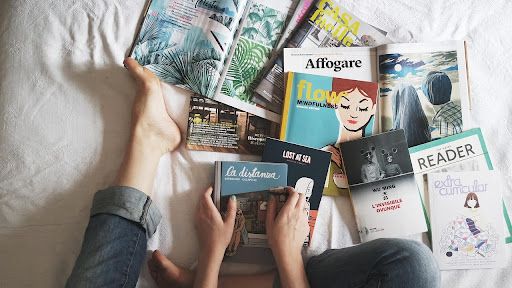
Turn the Page, Then Turn In
by Amelia Brooks
There’s something timeless about ending the day with a good book. The quiet rustle of pages, the soft glow of a bedside lamp, the feel of a novel in hand — it’s a ritual that feels indulgent in all the right ways. In a world that rarely slows down, bedtime reading offers a rare invitation to disconnect, unwind, and let the mind drift somewhere softer, all while keeping your eyes off screens.
Reading before bed can also be a powerful tool for better sleep. It’s a moment of intentional calm, a luxurious pause between the demands of the day and the promise of rest. Whether you’re escaping into fiction or savoring a few pages of poetry, the act of reading slows your breathing, eases mental tension, and prepares your body for deeper, more restorative sleep.
Here’s why you should consider curling up with a good book before lights out.
Reading: The Wind-Down Ritual You’re Missing
There’s a certain luxury in letting your mind drift away from the noise of the world, and reading before bed offers just that. It’s a gentle ritual that invites your body to slow down and your thoughts to soften. A compelling story can sweep you into another place entirely, far from deadlines, worries, and the glow of screens.
Reading also taps into something deeply human: the need for narrative. Stories ground us, comfort us, and offer perspective. They give shape to our thoughts and let us observe without reacting, something especially helpful if your mind is racing when your head hits the pillow. Reading can redirect attention from anxious spirals to immersive plots, guiding you into a more focused, present, and restful state. It's a subtle shift, but a powerful one.
This nightly practice can become a form of mindfulness and meditation. It’s like repeating a mantra or following a breath, as reading demands ongoing attention on a single thread. The more often we do it, the easier it becomes to settle in.
And in some cases, simply opening a book can serve as a cue for the body to relax and prepare for rest. Over time, your mind gets used to this association, helping to train the brain to unwind at the same time each evening for a consistent wind-down routine.
The Research Is In: Reading Helps You Rest
Formal research on reading as a sleep aid is still emerging. But science has been pretty clear about the relationship between stress and sleep — less stress usually means longer, deeper rest. Reading could be a link between them.
Stress can make it hard to turn the brain off at night. But reading slows the heart rate, eases the muscles, and even helps distract you from what’s going on in the real world.
A study by the University of Sussex found that just six minutes of reading can reduce stress by up to 68%. That makes reading more effective than other ways to unwind, including music or going for a walk. When you consider that stress is one of the most common disruptors of sleep, the link between bedtime reading and better rest becomes clear.
How to Turn Pages and Turn Off Your Brain
There are right ways (and wrong ways) to read in bed. If you want to read your way to dreamland and good mornings, these tips can help.
Read real books, with real pages
Put the e-reader, technology, and bright LED screens to bed (not your bed, though). Screens emit blue light, which can block melatonin production and interfere with your natural circadian rhythm.
The better option is to choose real books. They don’t have screens, don’t require a backlight, and never need to be recharged. Books give you a tactile experience: holding the book, turning the pages, and connecting with printed words, all of which anchor the senses and prepare your body for sleep.
Choose light, easy reads
Not all stories make great bedtime stories. If your goal is relaxation and better sleep, it might be best to choose light, comforting reads that invite reflection rather than stimulation. Think gentle fiction, cozy mysteries, reflective essays, poetry, or anything that allows your mind to ease into a slower rhythm.
These types of stories create emotional safety, something you’ll appreciate as you move from wakefulness to rest. They don’t demand much from you mentally or emotionally, making it easier to let go and drift off when your eyelids grow heavy.
Use soft lighting or a reading light
Lighting can affect how you sleep, including how quickly you fall asleep at night. You’ll need light to read, so it’s best to choose soft lighting that gives you enough light to see the page without straining your eyes.
Great bedtime reading lights include:
Clip-on book lights
Himalayan salt lamps
Dimmable bedside lamps
Bulbs in soft or warm temperatures
Amber-hued lights
You’re not trying to light up the whole room, just your book. Low light can signal to the brain it’s time to sleep and help you stay in your natural sleep-wake cycle.
Prepare Your Bedtime Reading Routine with Bedsmade
A book makes an excellent bedtime companion, helping you to ease into a good night’s sleep. The right bed setup — soft lighting and cosy sheets — enhances every page.
Bedsmade makes it easy to sink into a good book, with premium, tailored bed sheets that stay in place all night long. Wake up to a bed that almost makes itself, ensuring it’s ready for you at night when you’re eager to dive into the next chapter.
Enjoy fiction, not friction, at bedtime — explore the Bedsmade collection and transform your nights!

